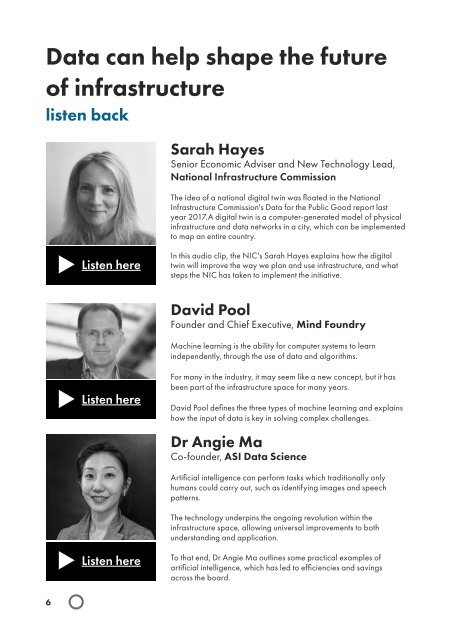Inspiratia InfraTech Takeouts
Create successful ePaper yourself
Turn your PDF publications into a flip-book with our unique Google optimized e-Paper software.
Data can help shape the future<br />
of infrastructure<br />
listen back<br />
Listen here<br />
Sarah Hayes<br />
Senior Economic Adviser and New Technology Lead,<br />
National Infrastructure Commission<br />
The idea of a national digital twin was floated in the National<br />
Infrastructure Commission's Data for the Public Good report last<br />
year 2017.A digital twin is a computer-generated model of physical<br />
infrastructure and data networks in a city, which can be implemented<br />
to map an entire country.<br />
In this audio clip, the NIC's Sarah Hayes explains how the digital<br />
twin will improve the way we plan and use infrastructure, and what<br />
steps the NIC has taken to implement the initiative.<br />
Listen here<br />
Dr Olga Feldman<br />
Directory, Advisory and Strategic Modelling, Data<br />
Analytics, Arcadis<br />
The Internet of Things is a digital network of physical devices and<br />
assets which allows the collection and exchange of data.<br />
Billions of devices around the world are connected to the internet<br />
with the ability to make every aspect of modern life smart.<br />
With this in mind, Dr Olga Feldman ponders how the Internet of<br />
Things should focus more on the application of data and not just its<br />
collection<br />
Mark Enzer<br />
Chair of Digital Framework Task Force and Chief<br />
Technical Officer, Mott MacDonald<br />
David Pool<br />
Founder and Chief Executive, Mind Foundry<br />
Dominic Thasarathar<br />
Thought Leadership, Autodesk<br />
Listen here<br />
Machine learning is the ability for computer systems to learn<br />
independently, through the use of data and algorithms.<br />
For many in the industry, it may seem like a new concept, but it has<br />
been part of the infrastructure space for many years.<br />
David Pool defines the three types of machine learning and explains<br />
how the input of data is key in solving complex challenges.<br />
Dr Angie Ma<br />
Co-founder, ASI Data Science<br />
Artificial intelligence can perform tasks which traditionally only<br />
humans could carry out, such as identifying images and speech<br />
patterns.<br />
Listen here<br />
Raw data is the key resource of the modern age, allowing more<br />
accurate information to be collected which leads to better decision<br />
making.However, the value of data has yet to be quantified,<br />
with new business, procurement and commercial models going<br />
unrealised.<br />
In this extract, Mark Enzer looks at how data can be valued, and<br />
is joined by Dominic Thasarathar for a discussion on who should<br />
benefit from the monetisation of data..<br />
James Dean<br />
Co-founder and CEO, SenSat<br />
A technology which can capture and analyse high quality<br />
information in real time is a valuable asset for any sector.<br />
The technology underpins the ongoing revolution within the<br />
infrastructure space, allowing universal improvements to both<br />
understanding and application.<br />
However, while drones can and have carried out these tasks, the use<br />
of this technology is not universal in the infrastructure space.<br />
Listen here<br />
To that end, Dr Angie Ma outlines some practical examples of<br />
artificial intelligence, which has led to efficiencies and savings<br />
across the board.<br />
Listen here<br />
James Dean and Dominic Thasarathar explore the role of these<br />
flying robots, and say why there needs to be long-term investment in<br />
technology to truly unlock its benefits for the infrastructure sector.<br />
6 7


